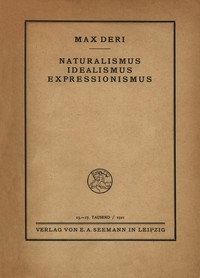Naturalismus, Idealismus, Expressionismus by Max Deri
Read now or download (free!)
| Choose how to read this book | Url | Size | ||||
|---|---|---|---|---|---|---|
| Read online (web) | https://www.gutenberg.org/ebooks/72877.html.images | 288 kB | ||||
| EPUB3 (E-readers incl. Send-to-Kindle) | https://www.gutenberg.org/ebooks/72877.epub3.images | 10.7 MB | ||||
| EPUB (older E-readers) | https://www.gutenberg.org/ebooks/72877.epub.images | 10.7 MB | ||||
| EPUB (no images, older E-readers) | https://www.gutenberg.org/ebooks/72877.epub.noimages | 228 kB | ||||
| Kindle | https://www.gutenberg.org/ebooks/72877.kf8.images | 11.2 MB | ||||
| older Kindles | https://www.gutenberg.org/ebooks/72877.kindle.images | 11.2 MB | ||||
| Plain Text UTF-8 | https://www.gutenberg.org/ebooks/72877.txt.utf-8 | 250 kB | ||||
| Download HTML (zip) | https://www.gutenberg.org/cache/epub/72877/pg72877-h.zip | 11.1 MB | ||||
| There may be more files related to this item. | ||||||
About this eBook
| Author | Deri, Max, 1878-1938 |
|---|---|
| LoC No. | 38024068 |
| Title | Naturalismus, Idealismus, Expressionismus |
| Original Publication | Leipzig: Verlag von E. Seemann, 1921. |
| Note | Reading ease score: 52.2 (10th to 12th grade). Somewhat difficult to read. |
| Credits | The Online Distributed Proofreading Team at https://www.pgdp.net |
| Summary | "Naturalismus, Idealismus, Expressionismus" by Max Deri is a theoretical treatise on aesthetics and the philosophy of art written in the early 20th century. The work delves into the nature and classification of artistic expression, examining the relationships between reality, perception, and the realms of artistic creation. Deri discusses various artistic movements, positing that there are four fundamental approaches to art: naturalism, naturalistic permutation, idealism, and expressionism, each representing different methodologies of conveying artistic sentiment and experience. At the start of the text, Deri introduces core concepts such as observation and theory, rooted in the ideas of Ernst Mach. He lays out a framework for understanding how human consciousness interacts with the external world and how this interaction influences artistic creation. The opening explores the distinctions between different aesthetic experiences, emphasizing the importance of isolating emotional responses to art from intellectual analysis. This sets the stage for a deeper exploration of how different styles—such as naturalism's emphasis on accurate representation of nature and expressionism's focus on intensified emotion—serve as pathways for artists to communicate their inner experiences through their works. (This is an automatically generated summary.) |
| Language | German |
| LoC Class | N: Fine Arts |
| Subject | Aesthetics |
| Subject | Naturalism in art |
| Subject | Idealism in art |
| Subject | Expressionism (Art) |
| Category | Text |
| EBook-No. | 72877 |
| Release Date | Feb 5, 2024 |
| Copyright Status | Public domain in the USA. |
| Downloads | 133 downloads in the last 30 days. |
| Project Gutenberg eBooks are always free! | |

